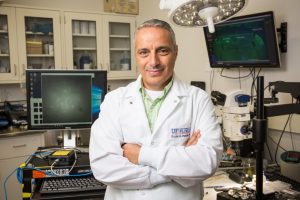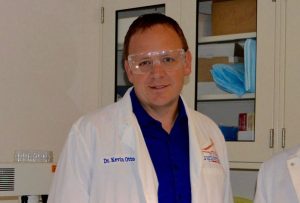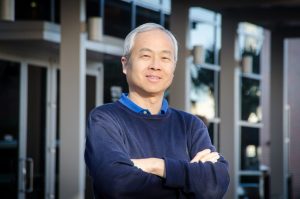From Alzheimer’s research to electrical stimulation, UF’s neural engineers are developing new techniques to unravel the complexities of the human brain.
 Cranial Nerve Stimulation
Cranial Nerve Stimulation
Karim Oweiss, UF Department of Electrical & Computer Engineering
Karim Oweiss is studying the mechanisms by which cranial nerve stimulation can affect brain activity. His lab will use advanced optical imaging that will produce extremely high-resolution images of brain dynamics to map the functional circuitry in areas of the brain responsible for executive function. This initiative is under the DARPA (Defense Advanced Research Projects Agency) Targeted Neuroplasticity Training program and has the potential to accelerate learning and long-term retention of information after rehabilitation.
Read more on Dr. Oweiss’ research.
 Neural Pathways in the Brain
Neural Pathways in the Brain
Kevin Otto , UF J. Crayton Pruitt Family Department of Biomedical Engineering
Under DARPA’s Targeted Neuroplasticity Training program, Kevin Otto is leading a team of neuroscientists to identify which neural pathways in the brain are activated by vagal nerve stimulation. This could potentially lead to an expansion of the use of vagal nerve stimulation, a therapy currently applied to prevent seizures in patients with epilepsy and to treat depression and chronic pain.
Read more on Dr. Otto’s research.
 Navigating Changing Environments
Navigating Changing Environments
Daniel Ferris, UF J. Crayton Pruitt Family Department of Biomedical Engineering
Human locomotor adaptation is necessary to maintain the flexibility of walking safely and effectively through changing environments. With support from the National Institutes of Health, Dan Ferris is investigating how the brain controls locomotor adaptations using electroencephalography, or EEG, sensors. The information gained from this study could aid in developing new methods of diagnosis and treatment for gait disabilities.
Read more on Dr. Ferris’ research.
 Deep Brain Stimulation
Deep Brain Stimulation
Aysegul Gunduz, UF J. Crayton Pruitt Family Department of Biomedical Engineering
Aysegul Gunduz is testing Deep Brain Stimulation, or DBS, technology to help steady conditions such as Parkinson’s disease and essential tremor. Under the BRAIN (Brain Research through Advancing Innovative Neurotechnologies) Initiative, Gunduz and colleagues are testing devices that can simultaneously deliver stimulation, while recording targeted effects on the brain. The data they collect will help scientists better understand the neural signals that control tremors and determine the practicability of DBS on a need-only basis.
Read more on on Dr. Gunduz’s research.

Cognitive Effects of Surgery
Mingzhou-Ding , UF J. Crayton Pruitt Family Department of Biomedical Engineering
Mingzhou-Ding and collaborators at UF published a study on the aging brain’s response to anesthesia and surgery. The team reported that 23 percent of adults age 60 and older who underwent a total knee replacement experienced a decline in activity in at least one region of the brain responsible for specific cognitive functions. Fifteen percent of patients declined across all brain networks the team evaluated.

